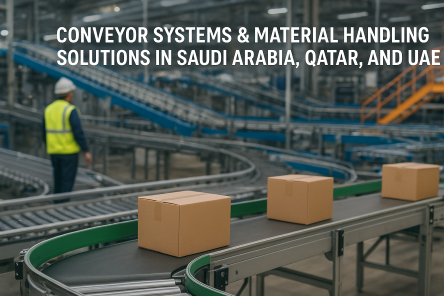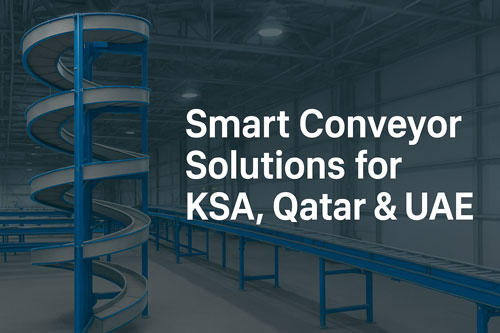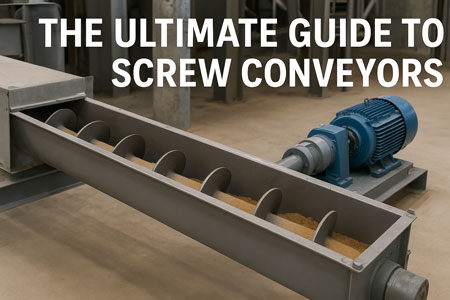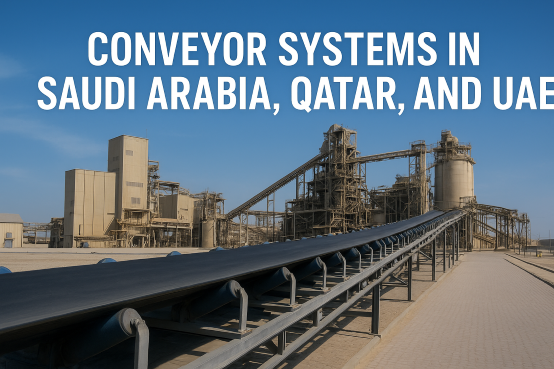
Conveyor Systems in Saudi Arabia, Qatar, and UAE: Complete Guide to Material Handling Solutions
August 27, 2025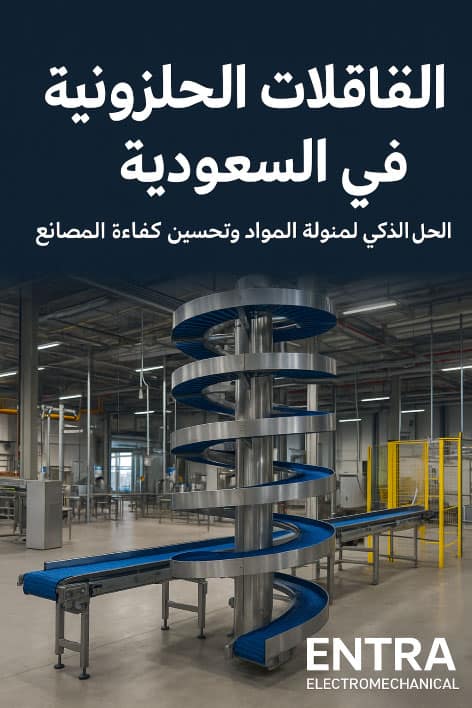
الناقلات الحلزونية في السعودية: الحل الذكي لمناولة المواد وتحسين كفاءة المصانع
September 2, 2025Introduction
In today’s competitive industrial landscape, efficiency is the key driver of profitability. Whether you operate in manufacturing, logistics, food and beverage, pharmaceuticals, oil and gas, or mining, your ability to move raw materials, semi-finished products, or packaged goods quickly and reliably determines your output and your bottom line. Across the Middle East — particularly in Saudi Arabia, Qatar, and the United Arab Emirates (UAE) — companies are investing heavily in modern conveyor systems and advanced material handling solutions to keep up with demand and align with national visions like Saudi Vision 2030 and UAE’s Industry 4.0 strategy.
This article explores how conveyor systems and material handling equipment are transforming industries across the Gulf, the types of conveyors available, how businesses can choose the right solutions, and why investing in automation and smart handling is no longer optional but essential.
Why Conveyor Systems Matter in the Gulf
The Gulf region is witnessing rapid industrial expansion. Saudi Arabia is developing massive industrial cities such as Jubail and Yanbu, Qatar is scaling up logistics and construction projects linked to energy exports, and the UAE continues to dominate in trade, warehousing, and e-commerce logistics.
All these industries rely on efficient material movement, and conveyors are at the heart of this transformation.
Key drivers for adopting conveyor systems in Saudi, Qatar, and UAE include:
-
Labor shortages & costs – Automated conveyors reduce reliance on manual handling.
-
Faster production cycles – Industries require continuous material flow without bottlenecks.
-
Health & safety compliance – Minimizing heavy lifting reduces workplace injuries.
-
Scalability – Conveyor systems can be expanded as production grows.
-
Global competitiveness – Companies in the Gulf must meet international standards of efficiency to compete.
Types of Conveyor Systems Used in Saudi Arabia, Qatar, and UAE
Different industries demand different solutions. Below are the most common conveyor systems widely used across the Gulf region:
1. Belt Conveyors
-
Ideal for: Food processing, packaging, warehouses, and airport baggage handling.
-
Advantages: Cost-effective, reliable, and customizable for different materials.
-
Example: In Riyadh’s food factories, belt conveyors streamline packaging lines for faster delivery to retailers.
2. Roller Conveyors
-
Ideal for: Pallet handling, carton movement, distribution centers.
-
Used heavily in: UAE logistics warehouses and Saudi automotive assembly lines.
-
Benefit: Excellent for moving heavy loads across long distances.
3. Chain Conveyors
-
Used in: Heavy industries like cement plants, mining, and steel production.
-
Benefit: Can transport bulk materials and withstand high temperatures.
-
Example: Saudi mining companies rely on chain conveyors to move raw minerals efficiently.
4. Pneumatic Conveyors
-
Ideal for: Powder and granular materials (cement, flour, plastics).
-
Common in: Qatar’s cement and construction materials sector.
-
Benefit: Dust-free, hygienic, and suitable for food-grade environments.
5. Automated Conveyor Systems
-
Smart conveyors integrated with sensors, robotics, and IoT.
-
Common in: UAE’s e-commerce fulfillment centers (e.g., Dubai free zones).
-
Advantage: High-speed sorting and tracking with minimal human input.
Material Handling Solutions Beyond Conveyors
Conveyors are the backbone, but material handling solutions go beyond moving items. In Gulf industries, solutions often include:
-
Automated Storage & Retrieval Systems (AS/RS): Used in UAE warehouses to maximize vertical storage.
-
Pallet Handling Systems: Essential for Saudi logistics hubs where large palletized goods are stored.
-
Lifting & Hoisting Solutions: Cranes and lifts complement conveyors in construction and manufacturing.
-
Bulk Handling Equipment: For cement plants and petrochemical industries in Qatar.
-
Conveyor Accessories: Rollers, belt cleaners, safety guards, and motorized drives for better performance.
Industry Applications in the Gulf
1. Food & Beverage
-
Saudi Arabia: Food factories rely on conveyors for packaging, labeling, and palletizing.
-
Qatar: Flour and sugar mills use pneumatic systems for hygienic handling.
-
UAE: Large beverage plants in Dubai depend on high-speed conveyors to meet export demand.
2. Pharmaceutical & Healthcare
-
Precision conveyors transport delicate products like syringes and medicine blister packs.
-
The UAE’s pharma hub in Abu Dhabi uses fully automated conveyors integrated with robotics.
3. Oil & Gas / Petrochemicals
-
Saudi Aramco projects and QatarEnergy plants depend on bulk handling conveyors for raw materials.
-
These systems withstand harsh environments and high capacities.
4. Logistics & Warehousing
-
Dubai Logistics City and Saudi dry ports rely on conveyors for faster goods movement.
-
Automated sortation conveyors reduce customs clearance delays.
5. Mining & Construction
-
Bulk conveyors move limestone, bauxite, and aggregates in Saudi and Qatar’s mining industries.
-
Heavy-duty chain conveyors are common in cement plants.
Benefits of Conveyor Systems in KSA, Qatar, and UAE
-
Efficiency – Faster movement of goods across production lines.
-
Scalability – Systems grow with industrial expansion.
-
Reduced Downtime – Automated conveyors minimize stoppages.
-
Safety – Workers face fewer lifting and handling risks.
-
Cost Savings – Lower labor costs and faster ROI.
-
Compliance – Meets ISO and HACCP standards for food and pharma industries.
-
Competitive Advantage – Faster delivery means stronger position in GCC markets.
Choosing the Right Conveyor System
Companies in Saudi Arabia, Qatar, and UAE must evaluate:
-
Type of material (powder, pallet, cartons, liquids).
-
Environment (temperature, humidity, dust).
-
Capacity & speed required.
-
Automation level needed.
-
Integration with existing ERP or warehouse systems.
A good supplier should provide custom conveyor design, installation, and after-sales support.
Why ENTRA Electromechanical is a Leading Choice
For companies seeking reliable conveyor systems and material handling solutions across the Middle East, ENTRA Electromechanical (entra-eg.com) is a trusted partner.
What sets ENTRA apart:
-
15+ years of expertise in conveyor manufacturing.
-
Custom designs for Saudi, Qatar, and UAE industries.
-
High-quality components for durability.
-
Automation-ready solutions with IoT integration.
-
After-sales service & maintenance ensuring smooth operations.
ENTRA has supported projects in food, logistics, mining, and industrial plants, helping companies scale while reducing downtime.
Future Trends: Smart Conveyors in the Gulf
-
IoT & AI-powered conveyors for predictive maintenance.
-
Energy-efficient belts for sustainability.
-
Robotics integration for fully automated factories.
-
E-commerce-driven conveyors in UAE and Saudi warehouses.
These trends align with national goals like Saudi Vision 2030 and UAE’s digital transformation strategies, making conveyors a cornerstone of smart industries.
Conclusion
The demand for conveyor systems and material handling solutions in Saudi Arabia, Qatar, and UAE is only going to grow. With industries expanding and automation becoming essential, conveyors are no longer just optional tools — they are strategic investments that define competitiveness, efficiency, and sustainability.
By choosing the right partner like ENTRA Electromechanical, businesses can access custom-designed conveyors, reliable performance, and cutting-edge automation to meet the challenges of tomorrow.
If your company in the Gulf is looking to increase efficiency, reduce costs, and future-proof operations, it’s time to invest in advanced conveyor systems and material handling solutions.

